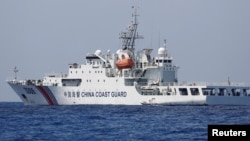Beijing is placing its coast guard under military command to warn foreign nations, including the United States, against interfering with its control over the disputed South China Sea, experts say.
This change, effective July 1, follows the passage of U.S. navy vessels through the sea seven times since U.S. President Donald Trump took office last year and a B-52 fighter plane flyover by the United States earlier this month.
The coast guard’s new command fits Chinese President Xi Jinping's effort since 2012 to improve the reach and capability of the armed forces, scholars believe.
Reassignment of the coast guard from the State Oceanic Administration to the People’s Armed Police will “enable it to play a bigger role in emergencies and crises including war,” the Communist Party-run news website Global Times said Monday.
“While certainly increasing their presence, also it’s to send a message that they’re determined to protect their territorial integrity,” said Andrew Yang, secretary-general of the Chinese Council of Advanced Policy Studies in Taiwan. “Certainly the U.S. will pay attention to it.”
Stronger coast guard under military control
China will establish a “marine police corps” under the armed police to enforce laws and protect China’s maritime “rights” following a decision June 22, the official Xinhua News Agency reported.
The government’s Central Military Commission will oversee the new coast guard, letting the fleet get involved more easily in naval exercises, the Global Times said, citing a Chinese military expert.
Xi told the army last year to “enhance its capability to win wars,” Xinhua said. The Chinese navy had been venturing last year past its traditional zone along the Chinese coasts toward the high seas.
The coast guard’s 16,300 personnel and 164 cutters will probably do more joint patrols with the navy, experts say. The two units already patrolled the sea’s Paracel Islands together last month, news media in Asia reported last month.
Warnings to Southeast Asia, United States
Brunei, Malaysia, the Philippines, Taiwan and Vietnam all compete with China's claims in the sea, which is prized for fisheries, oil and natural gas. China cites historical records to support its claim to about 90 percent of it.
China has built military installations on several islets in the 3.5 million-square-kilometer tropical sea, irritating the other claimants.
The coast guard as a military unit “strengthens the perception and reality of ‘militarization’” of the sea, said Yun Sun, East Asia Program senior associate at the Stimson Center think tank in Washington.
Chinese coast guard vessels, sometimes sent to protect fishing fleets, have ranged as far into the sea as Indonesia, which protested over an incident in 2016.
Washington regards the sea as an international waterway. The U.S. government sends naval vessels as “freedom of navigation operations.”
“The enhanced cooperation indicates the strengthening of Chinese capability to deter or harass U.S. freedom of navigation operations,” Sun said.
Heightened vigilance
China's coast guard will “not pose a threat” to other countries if “they don't provoke China's sovereignty and maritime rights,” the Global Times said, citing the military expert.
But military command of the Chinese coast guard will put other claimants, as well as the United States and its allies, more on guard, other analysts say.
The Southeast Asian states lack China’s firepower, but Vietnam and the Philippines have turned in the past to the United States for defense.
The other maritime claimants and Indonesia may take a stauncher “posture” toward the military-managed coast guard, Koh said.
"This more muscular posture of putting the navy and the coast guard together is a way to tell the other claimants that you don’t trifle with us," said Collin Koh, maritime security research fellow at Nanyang Technological University in Singapore.
When fishing or coast guard vessels from other countries run into China’s coast guard now, they don’t expect it to be “heavily armed,” said Jonathan Spangler, director of the South China Sea think tank in Taipei. They would see the fleet differently under central military command, he said.
“Other countries may have a different view of what the China coast guard represents, and that could definitely make people nervous in those unanticipated encounters, and maybe other countries will see this development as something they need to respond to in terms of restructuring their own coast guards," Spangler said.




